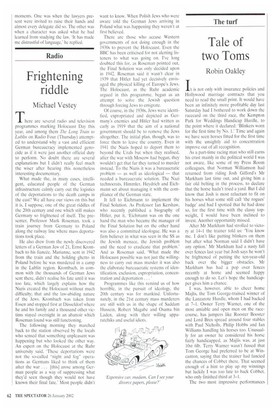Radio
Frightening riddle
Michael Vestey
There are several radio and television programmes marking Holocaust Day this year, and among them The Long Train to Lublin on Radio Four (Thursday) attempted to understand why a vast and efficient German bureaucracy implemented genocide as if it were just another official duty to perform. No doubt there are several explanations but I didn't really feel much the wiser after hearing this nonetheless interesting documentary.
What made the, in many cases, intelligent, educated people of the German infrastructure calmly carry out the logistics of the deportations to the death camps in the east? We all have our views on this but it is, I suppose, one of the great riddles of the 20th century and one which still makes Germany so frightened of itself. The presenter, Professor Mark Roseman, took a train journey from Germany to Poland along the railway line where mass deportations took place.
He also drew from the newly discovered letters of a German Jew of 21, Ernst Krombach to his fiancée, Marianne, sent in 1942 from the train and the holding ghetto in Poland before he was murdered in a camp in the Lublin region. Krombach, in common with the thousands of German Jews sent there, didn't realise his fate until it was too late, which largely explains how the Nazis created the Holocaust without much difficulty; that and the law-abiding nature of the Jews. Krombach was taken from Essen and stopped first at Dusseldorf where he and his family and a thousand other victims stayed overnight in an abattoir which Roseman found was still functioning.
The following morning they marched back to the station observed by the locals who sensed that something unpleasant was happening but who looked the other way. An expert on the Holocaust at the Ruhr university said, 'These deportations were not the so-called "night and fog" operations as Germans liked to think of them after the war . .. [this] arose among German people as a way of suppressing what they'd seen though they would not have known their final fate.' Most people didn't want to know. When Polish Jews who were aware told the German Jews arriving in Poland what was happening they weren't at first believed.
There are those who accuse Western governments of not doing enough in the 1930s to prevent the Holocaust. Even the BBC has been criticised for not alerting listeners to what was going on. I've long doubted this for, as Roseman pointed out, the Final Solution was only decided upon in 1942. Roseman said it wasn't clear in [939 that Hitler had yet decisively envisaged the physical killing of Europe's Jews. The Holocaust, as the Ruhr academic argued in this programme, began as an attempt to solve the Jewish question through forcing Jews to emigrate.
Of course, in the 1930s, Jews were identified, expropriated and depicted as Germany's enemies and Hitler had written as early as 1919 that the aim of a national government should be to remove the Jews altogether. The initial plan, though, was to force them to leave the country. Even in 1941 the Nazis hoped to deport them to beyond the Urals but when they realised, after the war with Moscow had begun, they wouldn't get that far they turned to murder instead. To the Nazis it was a bureaucratic problem — as well as ideological — that needed a bureaucratic solution. The Nazi technocrats, Himmler, Heydrich and Eichmann set about managing it with the compliance of the German state.
It fell to Eichmann to implement the Final Solution. As Professor Ian Kershaw, who recently published a biography of Hitler, put it, 'Eichmann was on the one hand the man who became the manager of the Final Solution but on the other hand was also a committed ideologue. He was a firm believer in what was seen in the SS as the Jewish menace, the Jewish problem and the need to eradicate that problem.' And as Roseman said, 'What made the Holocaust possible was not just the willingness to carry out mass murder it was also the elaborate bureaucratic systems of identification, exclusion, expropriation, concentration and deportation ..
Programmes like this remind us of how horrible, in the pursuit of ideology, the 20th century was for mankind. Unfortunately:, in the 21st century mass murderers are still with us in the shape of Saddam Hussein, Robert Mugabe and Osama bin Laden, along with their willing apparatchiks and useful idiots.


















































































 Previous page
Previous page